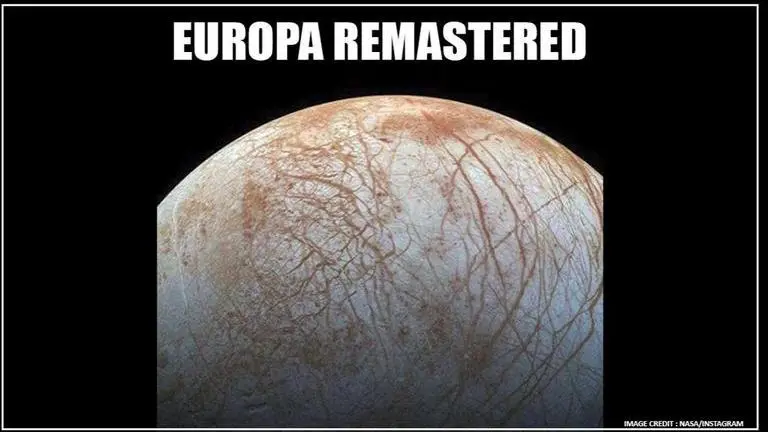Updated 4 May 2020 at 07:49 IST
NASA uncovers alluring 'chaos terrain' in its quest to find ocean on Jupiter's moon Europa
NASA has remastered some of Galileo's stunning images of Jupiter's moon Europa. The splendid remastered images shed new light on Europa's ocean and terrain.
- Science News
- 2 min read

The idea of life on Jupiter's ice-covered moon Europa has fascinated scientists for decades but it was in the 1990s, with sharp images from NASA's Galileo spacecraft, that researchers came a step closer to believe in its possibility. NASA has now remastered some of Galileo's stunning images of Europa, using improved new calibrations to introduce colours, in a bid to have a closer look at the Jovian satellite.
In the splendid images shared on Instagram, Europa's long erratic winding lines throw new light on its varied landscape. As explained by NASA, the image shows a region where ice blocks have moved sideways, rotated or tilted before refreezing in their new locations and to understand how it might have happened, scientists study these ice blocks like they were jumbled pieces of a puzzle. While geologists have dubbed these as 'chaos terrain', the remastered images are simply fascinating.
Take a look here:
Advertisement
Ocean on Europa
The long curving lines in the remastered images hint at subsurface liquid water. While releasing these images on the NASA website, scientists elucidated that tidal motion experienced by Europa in its elliptical orbit around Jupiter supplies the energy to keep the ocean in a liquid state under an ice shell of 15 to 25 kilometres. The cosmic ocean is estimated to be 60 to 150 kilometres deep. Therefore, while the Jovian satellite is only one-fourth the diameter of Earth, Europa's ocean is estimated to contain twice as much water as our planet.
Most recent observations from the Hubble telescope, and reanalysis of old Galileo data, have suggested that Europa's ocean may be leaking into space. In fact, in November 2019, an international team of scientist announced detecting water vapours for the first time above Europe's surface. The observation was made using a spectrograph at NASA's Hawaii observatory as it measured the chemical composition of Europa's atmosphere comparing infrared light emission and absorption.
Advertisement
Published By : Prerna Vijayeni Panda
Published On: 4 May 2020 at 07:49 IST
